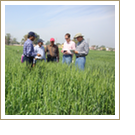 |
View this newsletter in your browser. |
 |
|
|
Research Highlights |
|
|
People Spotlights |
|
|
Program Updates |
|
|
In the News |
|
|
Calendar of Upcoming Events |
|
January |
Energy Seminar |
| Arno Harris, CEO of Recurrent Energy, a leading developer of solar power projects for utilities and large energy users » Read more ... |
|
|
January 14 |
Energy Seminar |
|
"Grid Flexibility and Research to Enhance the Integration of Variable Renewable Energy Sources" Mark O'Malley, Electrical Engineering Department, University College Dublin » Read more ... |
|
|
January 23 |
FSE / FSI Symposium |
|
"Agricultural Trade Policies and Food Security in Sub-Saharan Africa" Speaker: Kym Anderson, George Gollin Professor of Economics, School of Economics, University of Adelaide; Commentator: Johan Swinnen, Professor of Development Economics and Director of LICOS Center for Institutions and Economic Performance at the University of Leuven in Belgium. » Read more ... |
|
| February 4 |
Energy Seminar |
|
"Efficiency Limits of Energy Conversion and Storage Through Rational Materials Design" William Chueh, Materials Science and Engineering, Stanford University » Read more ... |
|
|
February 5 |
FSE / FSI Symposium |
|
"Africa's Food Systems in 2035" Paul Collier, Director, Centre for the Study of African Economies, Oxford University; Derek Beyerlee, Independent Scholar, Director, 2009 World Development Report; Jane Karuku, President, Alliance for a Green Revolution in Africa. » Read more ... |
|
|
February 11 |
Energy Seminar |
|
"Nuclear Waste Storage and Bore Holes" Andrew Orrell, Director of Nuclear Energy Programs, Sandia National Laboratories » Read more ... |
|
|
February 14 |
Environmental Forum |
|
"The Unrealized Potential of Field Kits to Reduce Toxic Exposures: Case Studies From Bangladesh (Arsenic in Groundwater) and Peru (Lead in Mine Tailings)" Alexander van Geen, Lamont Research Professor, Geochemistry Division and Lamont-Doherty Earth Observatory of Columbia University » Read more ... |
|
New Year, New LeadersWhat will 2012 be remembered for? It might go down as the year that policymakers got serious about adapting to a changing climate. Federal officials have requested $60 billion in emergency funds for Superstorm Sandy recovery, setting aside $13 billion to help government agencies prepare for extreme weather events. Among those anticipating serious climate impacts are the CIA and other intelligence agencies which recently commissioned a study warning that climate change will lead to more frequent and unpredictable water, food, energy and health crises. Stanford Woods Institute researchers are focused on finding practical solutions to these challenges and keeping decision-makers informed with the latest science. Case in point: Senior Fellow Chris Field (Biology) addressed delegates via video at recent U.N. climate negotiations in Doha, Qatar. Woods is also developing environmental leaders for the future. We recently announced a new cohort for our Rising Environmental Leaders Program and will soon do the same for our Leopold Leadership Program. Check the program's website in January for more details; we'll include the full story in the next issue of our newsletter arriving in February. Have a safe and peaceful holiday season.
Sincerely, |
||
|
Debbie Drake Dunne |
Jeffrey R. Koseff |
Barton H. Thompson, Jr. |
|
|

A Global System for Monitoring Ecosystem Service ChangeEarth's life-support systems are in flux, yet no centralized system to monitor and report these changes exists. Recognizing this, 77 nations agreed to establish the Group on Earth Observations. In a recent study, Natural Capital Project researchers, including Senior Fellow emeritus Hal Mooney (Biology) and Heather Tallis, a Woods postdoctoral scholar (Natural Capital Project), present a related conceptual framework to integrate national statistics, numerical models, remote sensing and in situ measurements to regularly track changes in ecosystem services - ways that land and water meet society’s needs - across the globe. This information will stimulate new research and provide the basis for assessments. |

Charting a Course to Sustainable AquacultureAquaculture is the fastest-growing animal food production sector and will soon supply more than half of the world's seafood. A recent study by Rosamond Naylor, senior fellow and Center on Food Security and the Environment director (Earth Sciences, FSI), and Stanford Ph.D. student Dane Klinger (Emmett Interdisciplinary Program in Environment and Resources), explores potential solutions to the industry's resource and environmental problems. Naylor and Klinger examine solutions such as novel culture systems; alternative feed strategies; and choosing species for aquaculture by stage of adoption, benefits, costs and constraints. The study also considers promising technologies and policies that could provide incentives for aquaculture innovation and environmental improvement. |

High-Value Agricultural Commodities and Poverty AlleviationDoes niche trade of expensive agricultural products that are grown in developing countries help alleviate poverty and protect the environment? A new study co-authored by Senior Fellow Eric Lambin (Earth Sciences) and Yann le Polain de Waroux, a newly appointed Woods postdoctoral researcher, considers the question with an eye toward argan oil, a plant oil used in beauty products that only exists in Southwestern Morocco and sells for more than $400 per liter. The study finds that argan oil commercialization has played a relatively minor role in household budgets and asset accumulation, whereas nonfarm work and remittances play a greater role. In addition, overextraction of the nuts led to a decline in the tree density of argan woodlands. Making markets work for the poor and achieving nature conservation through commercialization of niche commodities only works under certain conditions related to resource access and the connection between poor producers and wealthy urban consumers. |

Breeding Wheat for a Warmer FutureNew approaches to wheat breeding are needed to withstand increasingly common heat waves and keep pace with growing global food demand, according to a new study co-authored by Center Fellow and Center on Food Security and the Environment Associate Director David Lobell (Earth Sciences, FSI). Wheat is the most widely grown crop in the world; it is also one of the most sensitive to future global warming. Lobell and his fellow researchers evaluated 25 years of data from historical trials around the globe and analyzed the outcome of different past breeding approaches to help prioritize future strategies. |
| For more research, see the Stanford Woods Institute quarterly Research Digest. |
|
|

Barbara Block Puts Rolex Prize Toward 'Wired Ocean'Senior Fellow Barbara Block (Biology) was in New Delhi, India, recently to receive the Rolex Award for Enterprise for her work to follow the comings and goings of large marine predators using electronic tags. Block has already used part of the $104,000 award to fund development of Shark Net, a free app that allows anyone to track sharks and other marine animals in real time. She also plans to use the prize to fund testing of wave-powered robots and buoys for observing species in the open ocean. In addition, Block is looking at ways to build international protection for open-sea predators such as white sharks and bluefin tuna. Watch a video about Block’s research. |

Rosemary Knight HonoredSenior Fellow Rosemary Knight (Earth Sciences) was awarded Honorary Life Membership from the Near-Surface Geophysics Section at the annual meeting of the Society of Exploration Geophysicists in November. This is the third time the award has been given since the section was formed 20 years ago. Knight's research focuses on the development of geophysical methods for Earth imaging for environmental applications. She is particularly interested is the use of electromagnetic methods for exploring the properties and processes that control the distribution and movement of water in the earth's subsurface. |

Eric Lambin Publishes New BookProtecting nature doesn't require a renunciation of well-being, Senior Fellow Eric Lambin (Earth Sciences) argues in his new book, An Ecology of Happiness. To the contrary, Lambin says, living a more eco-conscious life is "a path to rediscover happiness, improve one's health and guarantee one's human security." The book explores the connection between what is dearest to us - health, security and happiness - and constructive engagement with 21st century environmental challenges. "There may be no better reason to value and protect the health of our planet than for our own personal well-being," Lambin writes. |

Whiskey Is for Drinkin' and Water Is for Fightin' OverIn an interview with Stanford-affiliated podcast Generation Anthropocene, Woods Co-Director Buzz Thompson (Law) discusses water security, the true cost of water and complications in the U.S. water law system. He starts with a story of how his grandfather was tricked into selling his farm to the City of Los Angeles so the city could get access to water on his land. He then dives into water security issues and discusses the true cost of water, the complications in the U.S. water law system, and what it was like to clerk for Supreme Court Justice William Rehnquist (which, it turns out, happened to involve quite a bit of tennis). |
|
|

Environmental Venture Projects Application Deadline: Jan. 11Last month, the Stanford Woods Institute sent a request for proposals to all Stanford faculty for the 2013 Environmental Venture Projects (EVP) program. The program provides seed funding for interdisciplinary research seeking solutions to global environmental and sustainability challenges. Woods will consider projects with budgets up to $100,000 a year for up to two years. Letters of intent (LOIs) will be evaluated for quality, intellectual merit, potential for solving environmental problems and likelihood of attracting ongoing funding. A selection committee will evaluate LOIs and make recommendations for inviting full proposals, with the goal of funding four to six proposals in 2013. LOIs must be submitted using this online application form by 5 p.m. PST on Jan. 11. |

Rising Environmental Leaders Program Announces 2013 CohortTheir backgrounds and research interests are as diverse as they are exceptional, but they all share a passion to become environmental leaders across sectors: academia, government, business, NGOs and think tanks. The 2013 Rising Environmental Leaders Program (RELP) cohort was selected from a competitive interdisciplinary field representing Stanford's seven schools. They are 21 Stanford postdoctoral scholars and graduate students whose research ranges from engineering and earth sciences to education and law. RELP builds leadership and communications skills with experiential learning and exposure to leaders from government, NGOs, think tanks and business. A key component of the program is the D.C. Boot Camp, an intensive week that introduces participants to a range of government-sector professionals, including Stanford alumni. The overarching objective is to provide firsthand knowledge about national policy development, partnership building and public service careers. |

COS Aids State and National Effort to Combat New Ocean ThreatWhen Washington State Gov. Christine Gregoire announced the recommendations of a Blue Ribbon Panel on ocean acidification - a new threat to the state's shellfish industry - it was the culmination of nearly a year of work by Meg Caldwell, senior lecturer and executive director of the Center for Ocean Solutions (Law). At the panel's request, Caldwell had advised Ryan Kelly, a Woods postdoctoral scholar, and Jenny Grote Stoutenburg, the authors of a special report titled "Washington State's Legal and Policy Options for Combating Ocean Acidification in State Waters." The panel referred to the analysis in its deliberations and included a copy of the report in its final recommendations, which were released Nov. 27. |

Natural Capital Project Works with Asian GovernmentsStaff members with the Natural Capital Project have been traveling quite a bit lately. In December alone, they will be in Bhutan and Nepal training government officials, scientists and environmentalists in the program’s Integrated Valuation of Environmental Services and Tradeoffs (InVEST) software. In China, InVEST is being used to implement a national assessment of the change in the country’s natural capital from 2000 to 2010. InVEST is also playing a role in Indonesia, where rapid proliferation of oil palm plantations and commercial forestry is reshaping the landscape. Natural Capital Project staffers have helped identify an alternative land-use plan for Sumatra that would result in higher carbon stocks, reduced sedimentation, cleaner water and greatly enhanced habitat quality, compared to the current government plan. Regional governments are now incorporating these findings into their planning. |
|
|
|
Selected media coverage of the Stanford Woods Institute and its fellows, affiliated scholars and supported research. |
For Planes, a Climate Antidote: Bypass the ArcticThe New York Times, Dec. 3 |
Public Opinion Has Moved on Climate Change. Will Obama Follow or Fiddle?Mother Jones, Dec. 3 |
In Indonesia and Malaysia, as Demand for Palm Oil Grows, So Do Environmental, Labor ConcernsWashington Post, Nov. 26 |
Can Shellfish Adapt to More Acidic Water?National Public Radio, Nov. 23 |
|
Find Us on the Web |
|
Read more News and Media Coverage from the Stanford Woods Institute's fellows and affiliated faculty, including fellows with our Leopold Leadership Program.
Submissions Past issues can be found online. For more information about the Stanford Woods Institute, visit our website, or email us at environment@stanford.edu. |